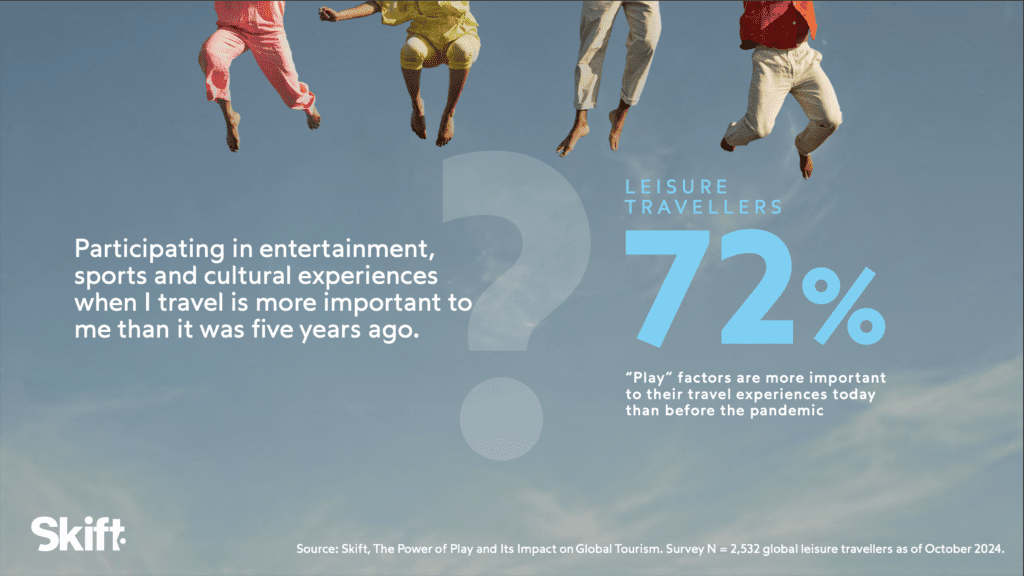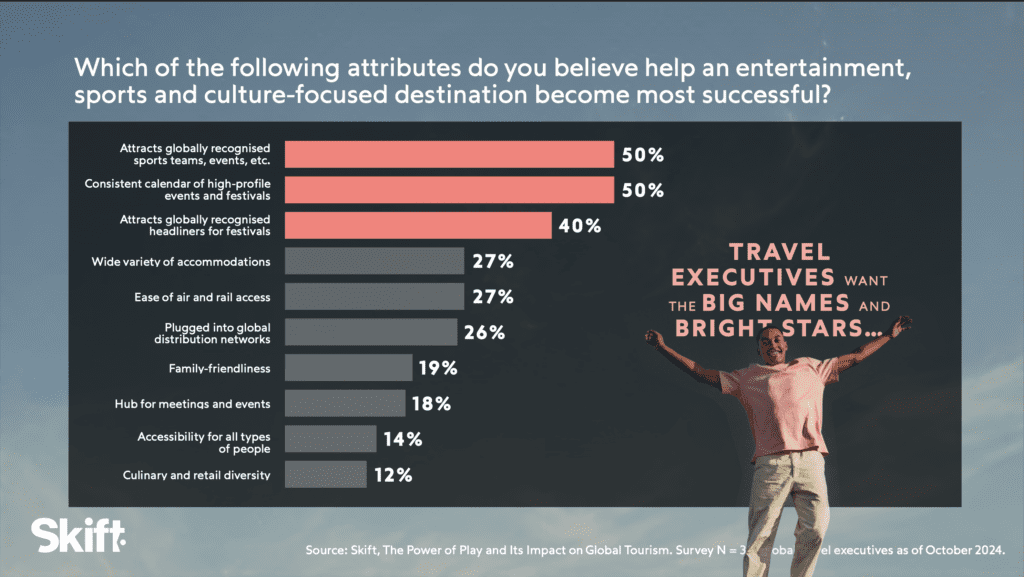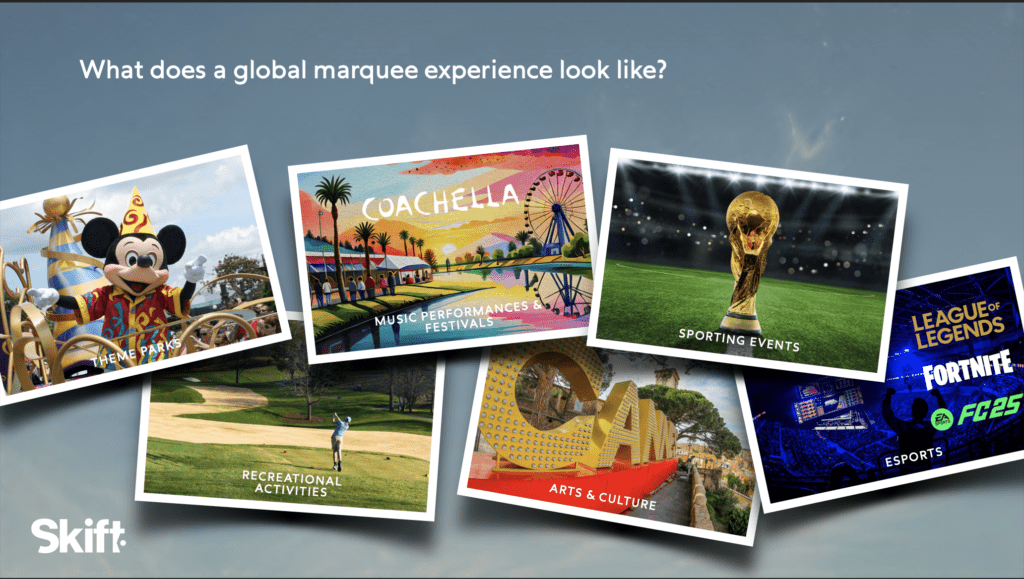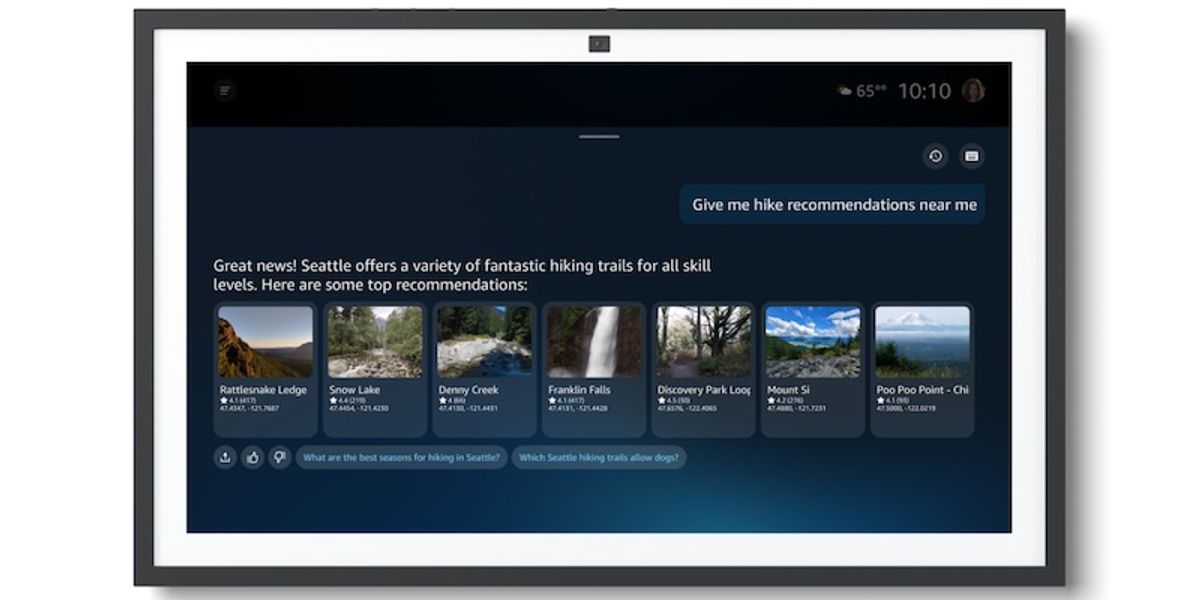How Play Tourism Is Inspiring a New Generation of Travelers

Traveler demand is on the rise for unique experiences that have meaningful ties to who they are as individuals. Global travelers are becoming more aware of issues like overtourism in popular destinations and also more wary of overexposure in the hottest “it” locations. Coupled with a wider shift among global consumers to invest in experiences over material goods — especially among younger generations — many travelers are looking inward as a source of travel inspiration.
Enter the era of “play” in global tourism. A recent panel discussion at the World Travel Market in London — entitled “Exploring the Power of Play” — revealed insights from a new survey from Skift and Qiddiya City of more than 2,500 consumers and 300 travel executives. Panelists also told real-world stories of innovative approaches to encouraging play for an evolving cohort of global travelers.
This article explores several key trends centered on changes in sentiment around the importance of entertainment, sports, and cultural tourism. As customers demand more immersive, authentic, and memorable experiences, the travel industry has a significant opportunity to create new destinations and curated attractions around this shift in traveler preferences.
Why Travelers Want to Engage in Experiences Over Sightseeing
Momentum for entertainment, sports, and cultural tourism is clearly gaining in the post-pandemic, “experience-as-identity” era. That means for many, travel is becoming less about going to a specific place to make a statement about what they’ve seen or done, or to show off where they’ve been. Instead, it’s about doing things that reflect who they are and using that to formulate and project their own identity.
“The power of play is to move individuals and societies forward,” said Ross McAuley, MD Advisor and Director General at Play Qiddiya City DMMO. “People play to compete, they play to connect with each other, and they play to learn. Play is an instinctive part of what makes us human — it’s as natural to us as walking or breathing.”
According to Skift Research, Millennials strive to stand out by pursuing unique experiences rather than following the crowd. Seventy percent of American Millennial and Gen Z travelers seek travel experiences that are unfamiliar to their family and friends. In China, this percentage was 90 percent.
According to the Skift and Qiddiya City survey, 86 percent of travelers globally agreed that participating in entertainment, sports, and cultural experiences when they travel is important to an overall sense of happiness and well-being. That figure swelled to about 90 percent among Millennial and Gen Z travelers.
This sentiment is also on an upward trajectory. Nearly three-quarters of travelers said that participating in entertainment, sports, and cultural experiences when they travel is more important to them now than it was five years ago. Among Millennials, that figure reached 80 percent, compared to just 40 percent of Baby Boomers.


Why are these generational gaps so important? Because younger travelers are at the core of the larger cultural shift toward play.
“Our children are not following our prescribed trajectory, and they’re so discerning as to what they want to do with their money,” said Lubna Hussein, a partner at Consulum KSA, a Saudi-based government advisory firm. “They have a completely different paradigm of choice. The whole world is different now, and we have to look at creative ways to really look at what people actually want, and then tailor our offerings to those demands and expectations.”
Mike Waterman, President and CEO of Visit Anaheim, agreed. “All my kids couldn’t care less about owning a car or buying a home. They want to go and experience Saudi Arabia or Nashville,” he said. “They don’t want me to buy them stuff, they want to go buy experiences. So [in our work at Visit Anaheim] we’re embracing that new trend of travel and figuring out how to tap into those markets.”
Why Travelers View Play Tourism As a More Authentic Travel Experience
Not only is demand higher for play-focused travel, but people are also willing to spend more when it’s the focal point of their trip. More than two-thirds of travelers agreed that they are willing to spend more on travel that’s planned with entertainment, sports, or cultural experiences as a primary reason for their trip, a number that reached 77 percent among Millennials.
As consumer preferences shift toward more experiential travel, destinations that embrace entertainment, sports, and cultural tourism will be better positioned to attract both regional visitors and international travelers. Fifty percent of global travel executives agreed that a successful destination should attract globally recognized sporting events and a consistent calendar of high-profile events and festivals.
Interestingly, these factors, executives said, were much more critical than a wide variety of accommodations or ease of air and rail access.


The high-profile events and attractions that consumers listed as their top choices for an international trip across six different segments of entertainment, sports, and culture speak to the fact that a trip for play is more about the experience than the destination. From Disney to Coachella to the World Cup, people aren’t often just stopping through. They are making deliberate plans to seek these specific attractions that only exist in one place or time.


Perhaps nowhere has a more acute sense of place than Nashville, the “Music City,” which has catapulted to one of the top tourism markets in the U.S. over the past decade-plus. While music is the entry point for most people, upon that foundation now sits an entire travel ecosystem built around an authenticity to its roots.
“The power of play has driven the city of Nashville to economic heights nobody expected,” said Butch Spryidon, a strategic consultant for the Nashville Convention & Visitor Corporation, an organization he led for 32 years before retiring in 2023. “They would not have looked at the city if the big events, the music brand, and the culture weren’t here.”
To build that credibility, he credits a grassroots approach to ensuring that the city’s evolution would happen in concert with its local stakeholders.
“To be authentic, you have to be local,” Spryidon added. “You have to be intentional. Pay attention to your locals, and give them the opportunity to build support for the industry. It makes sure you keep your authenticity, and it’s a better experience for the visitor.”
According to Hussein, a similar movement is happening in Saudi Arabia. Governmental leaders may be the catalyst for setting tourism goals and funding projects, but the country’s people are driving the momentum.
“In Saudi Arabia, the transformation is incredible, and [we’re seeing] this huge determination from the leadership, so it’s top down. But it’s also met by the citizens bottom-up to redefine what Saudi Arabia means,” Hussein said.
McAuley agreed. “There’s a really interesting youth culture emerging in Saudi Arabia that we’re seeing, and I like to think that Qiddiya City can help harness that and build on that and be the torch-bearer for that culture. So when you come to Qiddiya City, you’re 100 percent going to have an authentic experience.”
For extensive research and deeper insights into the power of play and its impact on the future of global tourism, sign up to receive a new report from Skift and Qiddiya City, which will be published in December 2024. Those who provide their information will receive a FREE download that will be sent automatically when the report goes live.
This content was created collaboratively by Qiddiya City and Skift’s branded content studio, SkiftX.
link





